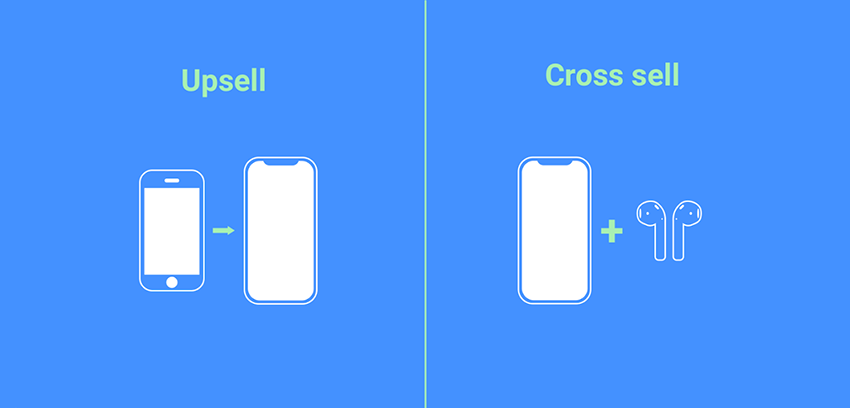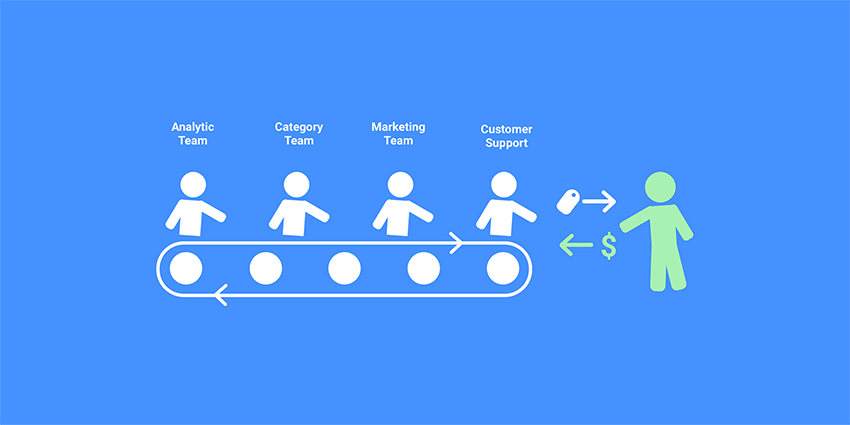Content navigation:
- 1. Make sure your prices promote an increase in profit margin
- 2. Have clear, well-defined goals
- 3. Communicate more with your customers
- 4. Create more incentive
- 5. Bundle and upsell your products to raise revenue
- 6. Lookout for new distribution channels & opportunities
- 7. Focus on your brand
- 8. Motivate your team
Using the eight established methods listed below, your business will be able to promote itself more efficiently to a wider audience, define goals which address targets for sales, profit and revenue in conjunction with each other, and ensure that your team is constantly working towards yours goals of bigger and better business growth.
Strategies to increase sales revenue
1. Make sure your prices promote an increase in profit margin
Pricing products effectively is no longer a vague form of art; competition and demand have made it a form of science as well. As markets continue to become more dynamic, your pricing strategy should reflect this by being flexible and agile. Your pricing strategy is the foundation with which you base your revenue and profit margins on, so if you haven’t created a strategy which is proven by data to promote profit, it is the first aspect of your business you should focus your attention to.
The data you need to begin improving and adapting your pricing strategy can seem endless, but keeping track of the information you need does not have to be a time-consuming task. With the help of advanced pricing software such as the platform we provide, perfecting your pricing strategy can be as easy as just a few clicks and can save you several hours of tedious labor.
Additionally, by utilizing our platform, you can be well prepared for the future effect of any decisions you make regarding price changes and will always be aware of how exactly each pricing decision you make is impacting your strategy, or whether they are in-line with your objectives. Bringing your pricing strategy out of the dark ages of manual, in-house monitoring and into the data-driven future is therefore a promising way to increase your sales and revenue, and is also one of the easiest positive changes you can integrate into your company.
2. Have clear, well-defined goals
If the previous point had you wondering what objectives you even had in the first place, now would be a good time to consider them in detail. The first step is defining your goals. Some might laugh at this prospect; surely, all businesses aim to promote growth, to increase their sales, and increase their revenue. But these three targets are not one in the same. For example, increasing your sales does not always lead to an increase in revenue. And promoting growth may require investments which do not initially result in a revenue increase, either.
Knowing where you want to go in the first place is the best way to figure out how to get there. You could have the best tools available to you in the world, but without you and your teams working towards clearly defined targets, you may find your goals harder to accomplish. The key here is to be as specific as possible. Set targets for individual product teams that are in accordance with more general objectives. If your main goal is profit increase, then you may want to see certain KVIs increase their profit margin by 5% within 2 or 3 months, for example. Without this structure, your business may struggle to come to conclusions about which actions to take in order to improve.
3. Communicate more with your customers
Customers appreciate being heard, and are surprisingly willing to converse with the retailers they buy from. Whether it be in the form of surveys, reviews or even referrals to others, customers want to communicate their thoughts about their shopping experience. For the retailer, this has several advantages.
Not only could customers direct you to more potential buyers in a more genuine manner than general marketing, they can also pinpoint flaws within your system that are hard to notice from any perspective but theirs. By opening multiple avenues of communication with your customers, you are essentially getting free press and free consultation to improve your business with. So long as your company is receptive to the feedback you receive, you will be able to make changes to your business that ensure a positive customer experience. The result will be an increase in traffic and sales, and therefore a likely increase in revenue as well.
4. Create more incentive
Everyone loves to celebrate. Whether it be important holidays like Christmas or more personal reasons like a birthday, giving your customers incentive to shop will give you a surge in sales. The retail industry as a whole has created events like Black Friday or Cyber Monday to promote sales and encourage consumers to shop. Many companies have gotten even more creative with this idea and have created their own holidays complete with promotions, discounts, and special offers that draw customers in and encourage them to buy multiple items at a time.
Your business can stand to benefit from personalizing offers to create more incentive to buy, like recording the birthdays of shoppers with loyalty memberships and offering customized discounts accordingly. In a more general sense, you could also create your own holidays surrounding your brand in order to bring in new customers and keep loyal customers coming. Many consumers are simply looking for a reason to buy more, and if you manage to find a creative reason to give it to them, you will see a spike in sales accordingly.
5. Bundle and upsell your products to raise revenue
Tying into the latter point, another great way to create incentive to buy is by bundling and upselling your products. Bundling may seem rather cut and dry, but you would be surprised by the many ways you can get creative with bundling products. It does not have to be as simple as bundling flower seeds with soil; you can easily bundle his and her products together for potential gift ideas, or find inspiration by looking through your sales data to find otherwise overlooked relationships between the purchasing of certain products and create an offer for them in conjunction.
Upselling is another great way to increase your sales and revenue. Sometimes customers know what they’re looking for, but aren’t yet aware of any better options. This is particularly true for electronics, for example. By displaying clearly a more expensive and advanced product compared to what they are searching for, you are likely to get eager customers hoping to improve their purchases and willing to pay the higher price. Both bundling and upselling are a fantastic way to both promote some of your products and also encourage shoppers to spend more while browsing your store.
6. Lookout for new distribution channels & opportunities
Your business may have a tried and true marketing strategy with successful channels to utilize. But what if you are missing out on other distribution channels and simply do not realize it? Auditing your marketing strategy is a great way to find new opportunities and audiences to market to, and improve your figures in the process. The best part? Finding new channels often requires little to no change to your current marketing strategy; you still keep your existing channels and the methods with which you sell via these channels. Regular auditing is the only extra step needed to find potentially lucrative new distribution channels for your business.
7. Focus on your brand
Your brand is a vital tool which shapes how your products are perceived. A good or bad brand image and greatly impact the prices that you can sell your products at. Customers are caring more about a brand’s character than ever before, and are willing to pay higher prices for a more trustworthy retailer.
There are several ways to protect and improve your brand image. Many retailers invest in sustainability and other environmentally conscious efforts regarding their products, or donate to charities. How you market your products also plays a role in how your brand is perceived; customers are getting smarter and react poorly to non-genuine marketing tactics. Simply put, if you stay smart with how you talk to your customer base and invest a little extra to provide more ethically produced products, your customers will reward you with their loyalty, and you will likely see these investments pay off in the form of increased sales and revenue.
8. Motivate your team
Studies show that customers care quite a bit about the employees of retailers they shop from. Companies known for poor work environments pay the price by damaging their brand image and negatively affecting their customer experience. Internally, employees who feel like they lack opportunity for promotion and/or that their work is not appreciated within the company are far less likely to put in their best work. Paying special attention to revenue and sales does not mean that your company needs to pay less regard to the happiness and wellbeing of its workforce. As a matter of fact, your revenue and sales could stand to benefit from putting extra care into providing motivation and inspiration for your employees. Properly compensated workers will show their appreciation by working harder towards company objectives, and you are less likely to have valued and experienced employees eventually leaving for greener pastures.
Conclusion
As you may have noticed, there are some common trends between these methods that can help you figure out how to increase sales and revenue. Firstly, innovation and forward-thinking are an important way of staying ahead of the curve, whether it be putting extra care into your brand, providing better compensation for employees, or paying more attention to the increasing demands of your customers. Secondly, technology is key to increasing sales and revenue. Advanced retail analytics tools can help your company get a better view of your market, find more opportunities for growth, price your products more effectively, and adhere to your objectives and targets. High-tech pricing software is akin to your retail GPS, directing you to paths that lead to more profit, more customers, and better business practices.
FAQ
Advanced technology is key to increasing sales and revenue. Advanced retail analytics tools can help to get a better view of your market, find more growth opportunities, price your products more effectively, and adhere to your objectives and targets.
The most popular growth strategies include market penetration strategy, market education strategy, product development, and diversification strategy.











